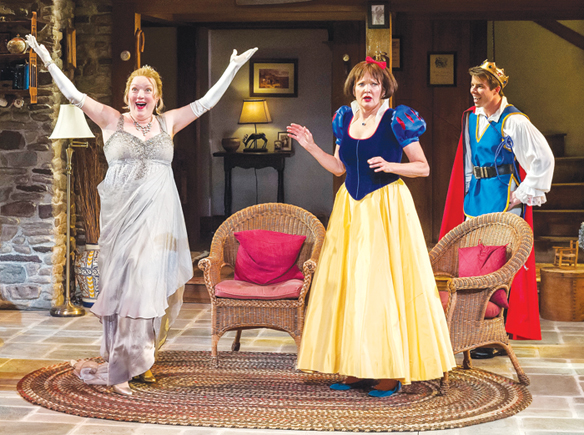In the playbill for “Vanya and Sonia and Masha and Spike,” now playing at the Mark Taper Forum, playwright Christopher Durang talks about his lifelong interest in the Russian playwright Chekhov and the melancholy characters he created in “Uncle Vanya,” “The Seagull” and “Three Sisters,” the latter being Durang’s favorite. He acknowledges that he loves “the emotional sadness in Chekhov” and the playwright brings this sense of melancholy and regret to the main characters in his latest comedy.
In the playbill for “Vanya and Sonia and Masha and Spike,” now playing at the Mark Taper Forum, playwright Christopher Durang talks about his lifelong interest in the Russian playwright Chekhov and the melancholy characters he created in “Uncle Vanya,” “The Seagull” and “Three Sisters,” the latter being Durang’s favorite. He acknowledges that he loves “the emotional sadness in Chekhov” and the playwright brings this sense of melancholy and regret to the main characters in his latest comedy.
Vanya, Sonia and Masha are siblings, but Sonia was adopted, a fact she continually mentions throughout. Their parents, now gone, were professors so enamored with the Russian playwright they named each child after a character in a Chekhov play.
While Vanya and Sonia have led quiet, boring, unmemorable lives, it turns out that Masha’s glamorous life hasn’t been a bowl of cherries either. The playwright shows us the regrets Sonia and Vanya have as they look back over the years, but their plight is handled with a deft and daffy touch that leaves us laughing even though we sympathize with them.
Spike, on the other hand, is a young, shallow hunk who is currently dating Masha. His arrival on the scene brings out a variety of reactions in each of the other title characters as he struts, preens, flexes his muscles or playfully strips down to his black underwear in ways that, while sexy, are totally laugh inducing.
Shalita Grant plays their psychic house keeper. Cassandra, who often gets flashes of what’s to come, and sometimes she’s even right. Rounding out the cast is Liesel Allen Yeager as Nina, a young neighbor and an aspiring actress.
The opening night audience laughed throughout, especially in Act I which goes more for physical comedy. For example, Nielsen, as dowdy Sonia, is a delight when she decides to doll up for a costume party. To add to her newfound sequined glamour she uses a great Maggie Smith accent to jazz up her image. Will she outshine Masha? Maybe.
In Act II Vanya’s monologue about the good old days of his youth when people were united by shared memories and TV shows like “Ed Sullivan” and “The Adventures of Ozzie and Harriet,” not tweets and twitters, brought down the house. The audience could relate and the applause was loud and long . Vanya’s heartfelt lament was a definite highlights of the evening.
While the laughs came fast and furious on opening night, the humor often stemmed from regrets about what might have been in this comedy about sibling rivalry and revelry. The show is funny, wistful and often hilarious.
Durang, who wrote “Sister Mary Ignatius Explains It All for You,“ Beyond Therapy” and the Tony nominated “A History of the American Film,“ has received countless awards for his comedies and won the 2013 Best Play Tony for “Vanya and Sonia and Spike.”
The Los Angeles production of his play, now at the Taper, is directed by David Hyde Pierce, based on the Broadway direction of Nicholas Martin. Pierce, a Tony winner, also won Emmy and Sag Awards for his role as Niles in the TV hit “Frasier” and was nominated for his performance as Vanya in the original Broadway cast.
“Vanya and Sonia and Masha and Spike” runs through March 9 at the Mark Taper Forum.
**
The Pasadena Playhouse presents the world premiers of “Above the Fold” starring Taraji P. Henson (“Person of Interest” on CBS and Academy Award nominee for Best Supporting Actress opposite Brad Pitt in “The Curious Case of Benjamin Button”) in the role of Jane, an African-American newspaper reporter from New York. She is sent to interview a Southern political candidate, but upon her arrival the focus shifts to a volatile incident on the local college campus where three white fraternity boys are accused of raping a young African-American woman, Monique (Kristy Johnson).
Suddenly Jane’s journalistic focus shifts to the plight of this young stripper who insists that three white, privileged frat boys raped and beat her. At first Jane sides with the charismatic, but manipulative stripper, but eventually Jane begins to have doubts.
The playwright raises question about journalistic exploitation of tragedy and what could result if suspects are wrongly accused. If that happens the retraction is usually buried on back pages of the newspaper, well below the fold.
If you are familiar with the Duke University story about fraternity boys from the lacrosse team accused of beating and berating a black stripper, the first act will seem slow and repetitious since you already know the back story as well as the final outcome.
The action and interest level picks up dramatically at the end of Act I when Jane interviews the three young frat boys accused and begins to have doubts.
Act II goes into the repercussions of her front page stories and how they eventually affect the three young men in question. The play’s title refers to the importance of having your story placed above the newspaper fold.
“Above the Fold” was developed in the Playhouse’s Hothouse series as a staged reading and is the second play by playwright Bernard Weintraub who began his writing career at The New York Times, eventually becoming a reporter working in New York, Vietnam, London, India and Washington, D.C. covering mostly politics and political campaigns.
In 1990 he moved to Los Angeles to cover the motion picture business for The New York Times, leaving in 1998 to begin his playwriting career. “Above the Fold” is his second play and will run at the Playhouse through Sunday, Feb. 23. For tickets phone 626-356-7529 or online at www.PasadenaPlayhouse.org.




















